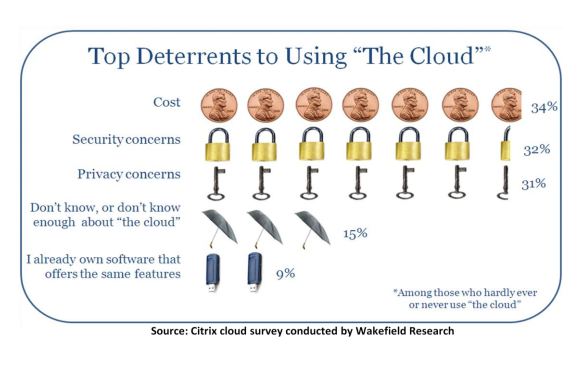
“The cloud.” I can’t think of a buzzword in tech that has garnered more headlines, hype, and confusion in recent memory. I remember Oracle CEO Larry Ellison scoffing at the concept during a panel a few years ago here in the valley, simply because we’ve always been storing and accessing data on remote computers. What’s the difference? It could be pricing models. It could be technical infrastructure. Or, as the cynic might suggest, it could be the Great Marketing Triumph of the early 21st century. After all, us champions of tech, us bleeding-edgers, love to re-invent things, and to re-visit things from our past – like, in this case, client-server computing.
The most entertaining part of cloud computing is the diversity of definitions you’ll get for the concept. Try bringing up the topic at a dinner party (preferably one involving your start-up friends, VCs and/or fans of The Big Bang Theory) and you’ll get anything but consensus. Most, though, will agree that “the cloud” is a big deal, and that there’s a veritable gold mine for those savvy enough to figure out how to monetize those streams of bits and bytes.
If we here in Silicon Valley wrestle with the “the cloud” and its definition and its impact, than what of the rest of the country?
Citrix just released some survey results (which were conducted by Wakefield Research) on the “masses” perception and understanding of cloud computing. The embargo lifted today, and I’m not exactly surprised with the main takeaway:
“51% believe stormy weather would interfere with their cloud computing.”
More interesting is that “the majority of Americans (54%) claim to never use the cloud.”
As the report points out, little do they — and a lot of us — realize is that in fact we are using cloud-based services every day, whether we know it or not. Banking online. Shopping online. Social networking sites such as Facebook and Twitter. Online games, and file- and photo-sharing service are all cloud-based. Come to think of it, the better question might be: what software and services are not cloud based?
Regardless, the cloud, according to this study, is at least perceived as important, and as the future:
“3 in 5 believe the ‘workplace of the future’ will exist entirely in the cloud.”
And lest you think this is not really, really important to our well-being and ability to move an industry and society at large forward:
“Nearly 1 in 5 (17%) have pretended to know what the cloud was during a first date.”
Those that do know what the cloud is all about — or at least think they know — are quick to point out that one of its primary advantages is the ability to work in their birthday suit from home. Someone, call Fox News.
Admittedly, this bit of research is unlikely to find its way into the halls of fame at Gartner or Forrester any time soon, but it does reveal that other side of technology that we often fail to consider: the human element.
Recently I attended a Churchill panel where Apple co-founder Steve Wozniak was marvelously pontificating about the future of mobile and the emergence of voice technology (“Eventually smell will matter. Eventually.”) Surprisingly, the room was filled with words such as humanization, sense, touch, smell, feel. Not once did I hear the term “API”. For such a techno-fueled discussion it was, as I later tweeted, refreshing.
One final finding from the report I found interesting:
The top deterrent from using the cloud cited by respondents to the survey is… cost.
How counter-intuitive!
Rounding out the top three concerns after cost (34%) are security (32%) and privacy (31%).
The number one reason I would suggest as the benefit for cloud technology is exactly that: cost.
It allows you to pay for what you use, and scale from there. You don’t need to build warehouses of server farms. You don’t need to invest in disk space unnecessarily. And you don’t need to employ a swath of IT professionals to manage the whole kit and kaboodle.
For Stark Insider and other sites we manage, we opted for Amazon Web Services. There’s no way even two or three years ago we could tap into that kind of horsepower and richly featured platform for such ridiculously low price points.
Further, most consumer cloud based services are free- or at least offer a free tier with minimal functionality. Dropbox, Google Drive, Pandora, Gmail, Microsoft’s new Outlook.com, Flickr, Facebook, Twitter… all are free. So I think this cost deterrent result is an odd duck.
Oh, so can stormy weather interfere with cloud computing?
Might want to ask Amazon, Rackspace or Savvis about that.
Maybe the masses really do know what they’re talking about…

